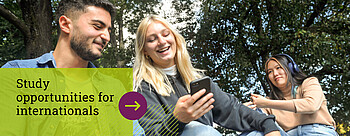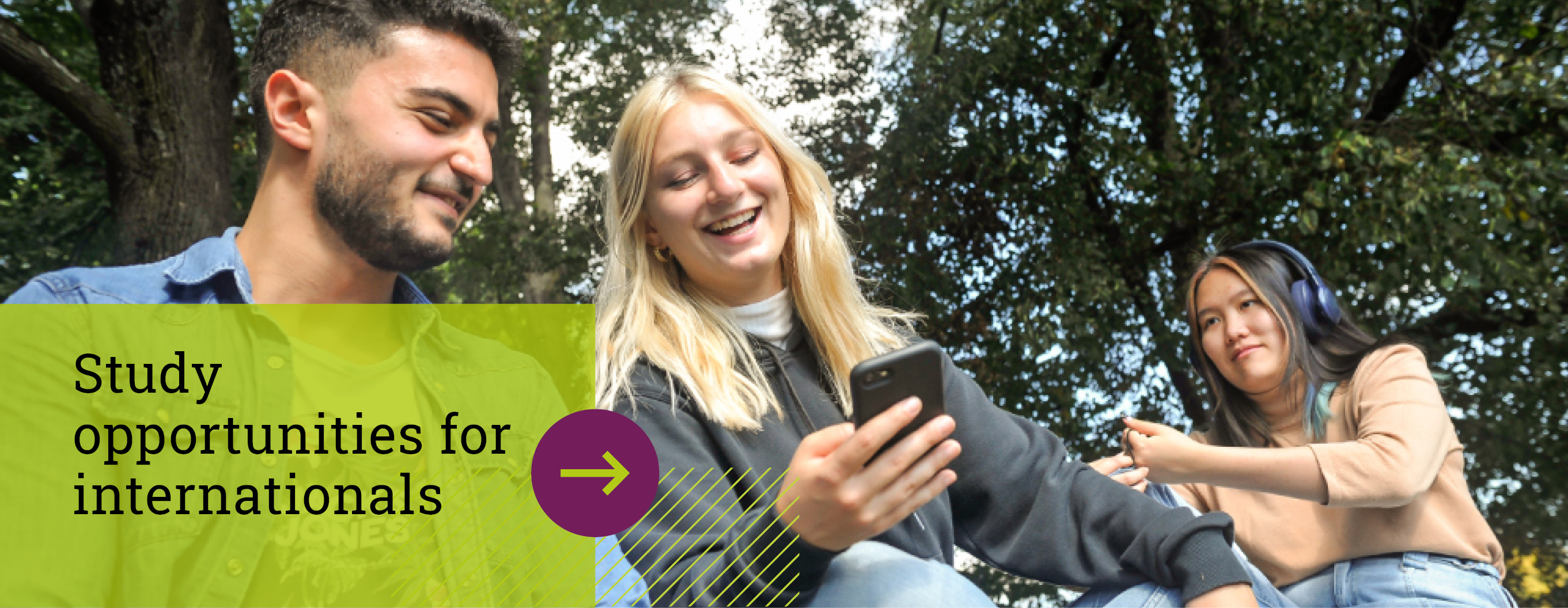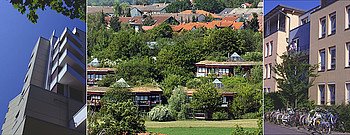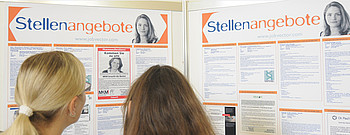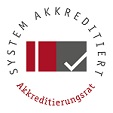Agribusiness (Master’s)
Your Path to Top Management
Agribusiness (Master’s)
Your Path to Top Management
Agribusiness takes account of the changes in the agricultural sector and addresses issues such as food safety, sustainable production, and resource conservation. It is a business-based degree program with a focus on the agricultural sector.
You can expect to receive an interdisciplinary education that combines content from our Faculty of Agriculture and Faculty of Business, Economics and Social Sciences. You will benefit from the diversity of subjects and the expertise of both faculties, and will be optimally prepared for your individual career path.
What you can expect:
- Immerse yourself in the diversity of knowledge from two faculties and follow your chosen path
- Combine current economic and agricultural sciences topics according to your individual interests
- Combine sustainability aspects with social and economic relevance
- Learn how to use AI tools
- Combine theoretical knowledge with practical application
- Reasons to choose Hohenheim
| Degree Master of Science (M.Sc.) |
4 semesters 120 credits |
Language German |
University places unlimited |
Location Stuttgart |
|||||

You can find information on the individual modules in the module catalog.
In your first year of study, you will acquire interdisciplinary, multifaceted know-how about the agribusiness in 7 compulsory modules. Depending on your previous education, you will further your qualifications by choosing two modules in business administration and economics or agricultural sciences.
If you have a previous education in agriculture or natural sciences, you will acquire additional knowledge in business administration and economics, including marketing and controlling as well as quality management. If your background is in business administration, you will acquire additional specialist knowledge in plant or animal production technology, environmental and nature conservation, or agricultural engineering.
In the further course of your studies, you can choose from both traditional business administration and economics subjects as well as production-related subjects in agricultural sciences. By choosing modules from both faculties, you can put together your own profile with a specialization in quality management, services, sustainability, e-business, or agricultural or food technology, for example.
Your self-chosen Master's thesis topic in the field of agribusiness will also contribute to your individual profile. You can work on the Master’s thesis either at the University of Hohenheim or in cooperation with companies.
If you are interested in a summer school or a stay abroad, this can be easily arranged in the 3rd semester. As long as you are well-prepared, it will not be a problem to have credits you earn during a summer school or stay abroad recognized for your program.
You want to know more?
Detailed information about the course and structure of the degree program can be downloaded here:
The goal of this Master's program, which is oriented on agriculture and business administration, is to prepare students for the job market as future leaders for companies and institutions in the agribusiness sector. Upon graduation, students have:
- Broad basic economic knowledge
- Knowledge of agricultural, environmental, and consumer issues
- Analytical and conceptual skills
- Innovative and independent thinking
- Expertise in the subject and social skills
In the Master's in Agribusiness, you will develop a broad profile based on agricultural and economic content. You will be ideally equipped for management positions in the agricultural and food industries upon completion of this program. The broad education prepares students for many different fields.
The following career paths are open to you:
- Marketing and product management
- Corporate management and organization
- Consulting along the agro-food value chain
- Research and development
- Press and public relations
- Client management
- Trade (sales, purchasing)
- Quality management
- Environmental and sustainability management
- Research and teaching tasks at universities
- Cooperatives and associations
- Farming
Potential employers include:
- Companies in the agricultural and nutrition sectors
- Associations and government agencies dealing with agriculture and the environment
- Cooperatives
- Consulting and service companies, e.g. in banking, insurance, and tax advising
- Advertising agencies or business consulting companies
- Organizations active in development cooperation
- Research institutions
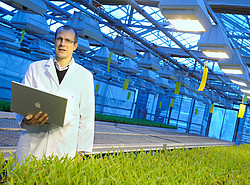
Good reasons to study at the Faculty of Agricultural Sciences in Hohenheim
First Place not Once but Three Times: The current Global Universities Ranking from U.S. News & World Report, the renowned NTU ranking, QS World University Ranking, and dathe Center of World University Ranking put University of Hohenheim’s agricultural research in 1st place in Germany.
In the agricultural university ranking from top agrar, the agricultural students at the University of Hohenheim give the grades 1.5 to 2.0. According to the ranking 2016, 88% of the students surveyed would recommend the University of Hohenheim for agricultural studies.
The University of Hohenheim puts great importance on quality teaching, which is demonstrated by several award-winning reform projects.
These projects include for example mobile teaching (German e-learning innovation and young scientists award (d-elina) in the category “Campus” at the BITKOM) or the ethics module, developed by the student group FRESH and awarded by the UN.

Extensive selection options make specialization or diversification possible. Students can choose from all the modules offered by of the Faculties of Agricultural Science and Business and Economics. Upon request, they can even select from all of the Master’s modules offered by the University of Hohenheim.

The vision of the Faculty of Agricultural Sciences is a global agricultural system which is productive, environmentally-friendly and socially-minded, and which is in harmony with society’s demand for a multi-purpose orientation.
Agricultural research at the University of Hohenheim is focused on four areas:
- Food for all: Security of global food supply
- Hazard prevention: Climate change and scarcity of resources
- Beyond fossil fuels: Bioenergy and bio-based value-creation networks
- Diversity instead of monoculture: Genome Diversity in Agriculture
There are no easy answers to these kinds of questions. That is why agricultural researchers at the University of Hohenheim work across disciplinary boundaries, collaborating with colleagues in the natural sciences, business administration and economics, and the social sciences, for instance in bioeconomics, a field of research and teaching that will become even more important in the future. That collaboration also has an impact on teaching.
Number 1 in internationalization: In the current EU ranking U-Multirank, the University of Hohenheim has a top spot in internationalization.
The basis for this placing is the decades-long, global commitment of the Agricultural Sciences. Especially our tropics research with 10 professorships has made the University known around the world.
International opportunities for students:
- 80 partner institutions worldwide (40 of which are in the Erasmus+ program)
- Member of the Euroleague for Life Sciences - the network for Europe’s best
- scholarship programs for travel, research, and exchange
- Worldwide alumni network
- Studies according to international standards for excellence and international competitiveness of graduates
Professors of the Faculty of Agricultural Sciences are in high demand.
The top experts include:
 | Chair of the scientific advisory council Prof. Dr. Martina Brockmeier The German Council of Science and Humanities is considered the highest-ranking advisory committee on topics of science in Germany. Its scientific members are appointed by the Federal President. |
 | In the Bioeconomy Council Prof. Dr. Regina Birner The Bioeconomy Council is an independent advisory committee for the German federal government. The goal: to establish a cross-sectoral and bio-based economy in Germany that uses as few fossil raw materials as possible. |
Further members in important commissions and expert lists
- Prof. Dr. Iris Lewandowski and Prof. Dr. Joachim Müller are members of the BMBF scientific advisory council "Agricultural Systems of the Future”
- Prof. Dr. Enno Bahrs is member of the BMEL scientific advisory council for biodiversity and genetic resources
- Expert lists on various agricultural topics

Scholarship and awards for studies, final theses, travel, and attending conferences: Thanks to many supporters, the University of Hohenheim has an unusually extensive scholarship culture.
Around 100,000 Euros is the total amount of all scholarships and awards that are presented each year at the Dies academicus.
More than 700 hectares of test area: Among German universities, the University of Hohenheim owns the largest amount of property. For students, this means a lot of room for their own experiments, research, and a great deal of hands-on experience.
Also directly on campus: State institutes for transferring science into practice, the Hohenheim Gardens, and the German Agricultural Museum.

The future lack of experts and managers in the area of agriculture / nutrition / horticulture means students of agricultural will have good career prospects. This was shown by a 2015 study by the Bundesverband Agrar Ernährung Umwelt (VDL).

The University of Hohenheim is a university with a long tradition. You will experience a truly unique university atmosphere enriched by the Baroque palace, the historic gardens and parks, and modern architecture: In 2009, the University of Hohenheim was declared the most beautiful campus university in the state.
In 2017, Hohenheim's President Stephan Dabbert was chosen by the German Association of University Professors and Lecturers (DHV) as the most popular president in Baden-Württemberg for the third year in a row. He was ranked second in all of Germany.
This jewel is located south of the state capital Stuttgart. Because it is close to Stuttgart, you have all the opportunities available in a big city. The University of Hohenheim is only a few minutes away from the airport, the Stuttgart Trade Fair Centre, and the autobahn and is easily reached with public transportation.
 | Unique party atmosphere: The historical Thomas-Müntzer-Scheuer, an old barn with a new purpose, is the party center of Hohenheim. |
 | The University ball in the pompous palace rooms is the social event of the year. |
Are you interested in an exchange semester? Make sure to start planning early. A stay abroad is best planned for your 3rd semester. It may also be possible for you to go abroad as part of your Master's thesis.
We engage in research and teaching cooperation with 80 partner institutions worldwide, 40 of which are part of the ERASMUS program.
The University of Hohenheim’s Office of International Affairs offers information and advising on stays abroad and how to finance them through scholarships.
| Application deadlines | |
|---|---|
| 1st subject-related semester |
|
Higher subject-related semesters |
|
| Requirements | |
|---|---|
| Formal requirements |
|
| Selection procedure | |
|---|---|
| Selection criteria | None, the number of places is not limited
For details, see the Admission Regulations (in German). |


